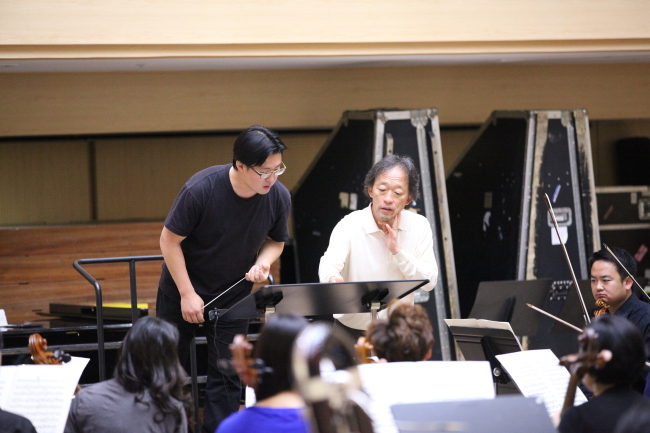“Conducting is a ridiculous technique,” maestro Chung Myung-whun told a young man standing with a baton, looking tense and serious, in front of members of the Seoul Philharmonic Orchestra on Saturday morning.
“Anyone in this room can learn how to do it after just a one-minute lesson.”
Chung then started drawing the shape of a box in the air with one hand, counting from one to four. “This is how easy it is.”
From this simple technique, conductors have to develop their own way to musically communicate with orchestra members to bring their musical ideas into reality, he explained. That’s the beauty of conducting.
Speaking to five young and promising conductors in the master class, Chung, who is arguably the only Korean to achieve international acclaim as a conductor, spoke candidly.
“After 30 years of doing this ― one, two, three, four (the four stages of conducting) ― I finally realized, ‘Oh, there’s something more.’”
That was what he calls Stage No. 5, in which one realizes that conducting is not standing in front of people doing that gesture, but actually sharing one’s musical thoughts with them.
There’s another stage after that in Chung’s theory ― Stage No. 6 ― but he would never be able to reach that level in his life, he said.
In the class, a rarity in the field of conducting in Korea, the five participants were each given 30 minutes to explore and lead the SPO in its performance of Brahms’ Fourth Symphony. Chung is the orchestra’s artistic director.
After each participant went through his or her chosen part of the symphony’s four movements, he offered comments, ranging from conducting gestures to a more fundamental question about how to interpret the music.
“Try to indicate as clearly and as simply as possible whether you want any change or no change,” he told a participant, pointing out that his body gestures were so excessive that they got in the way of music-making.
“When you do this (making big swings with both arms) all the time, you think you’re doing much, but actually you’re not.”
At one point, he told the participant: “Don’t do that with your legs. Stand still.”
“Try to reduce all the things that are not necessary. Find a way to show the big picture without getting in the way.”
When another participant took the podium, asking orchestra members to think of the “fear before death” and play the final movement of the symphony with such intense emotions, Chung talked about the common mistakes of younger hearts.
 |
Chung Myung-whun (right) speaks to Lee Tae-jeong, one of the five participants of the conducting master class held at the Seoul Philharmonic Orchestra’s rehearsal room in Seoul on Saturday. (Seoul Philharmonic Orchestra) |
“You talked about this death and fear, but usually if you have lived this long, you feel the richness and beauty of life,” he said, adding that the intensity that the young conductor was trying to bring out was, in his opinion, too harsh for Brahms’ music.
Chung said he, too, was a bit like the participant when he was young.
“The sound gets tighter and tighter and it becomes almost angry,” he warned.
“The orchestra is, for conductors, like an instrument,” the maestro said during a break. “What sound do we make out of the orchestra ― that’s our very first responsibility.”
He said he feels comfortable being called a “conductor” after turning 60 last year. Before that, he would have chosen, if possible, to be called a “young conductor.”
“Conducting really takes a lot of time ― a lot of study, practice and experience,” he said.
Lee Tae-jeong, one of the participants of the master class, said the 30 minutes with the SPO and Chung was a priceless experience.
“Every piece of advice (Chung) gave me really moved me, because he spoke not just from knowledge, but from his own experience. It was a great honor.”
Saturday’s master class was the second such event that the SPO held with its artistic director. A participant of last year’s program, Choi Soo-yeol, became the orchestra’s assistant conductor this June.
By Lee Sun-young (
milaya@heraldcorp.com)








